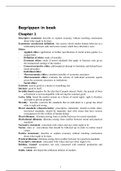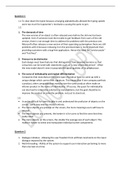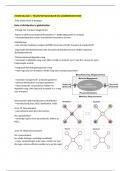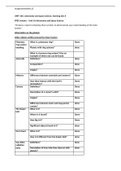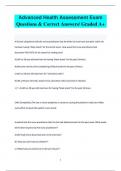Begrippen in boek
Chapter 1
Descriptive statement: describe or explain economy without reaching conclusions
about what ought to be done
Economics: neoclassical definition: ‘the science which studies human behavior as a
relationship between ends and scarce means which have alternative uses
Ethics:
- Applied ethics: application or further specification of moral action guides to a
certain field
- Definition of ethics: study of morality.
- Economic ethics: study of moral standards that apply to business only given
the institutional settings of the market
- General normative ethics: philosophical attempt to formulate and defend basic
moral principles
- Individual ethics:
- Macroeconomic ethics: considers morality of economic structures
- Microeconomic ethics: evaluates the actions of individual economic agents
given the economic structures or institutions
- Social ethics:
Extrinsic: merely good as a means to something else
Intrinsic: good in itself
Invisible hand:metaphor for the idea that if people interact freely, the pursuit of their
self-interest is not incompatible with serving the common good
Locke, John: based the market system on a theory of moral rights: right to freedom
and right to private property
Morality: ‘morality concerns the standards that an individual or a group has about
what is right and wrong
Moral standards (characteristics): prescriptive statements, should overrule other,
non-moral standards, should be impartial, deal with issues that have serious
consequences for the welfare of human beings
Moral dilemma : dilemma arising from a conflict between two moral standards
Motivational dilemma: dilemma arising from conflict between moral and practical
standards
Normative statement: concerned with values and says what ought to be
Norms: rules or conventions that should be followed up in order to realize moral
values
Positive statements: describe or explain economy without reaching conclusions
about what ought to be done
Practical dilemma: dilemma arising from conflict between two practical standards
Prescriptive statement: concerned with values and says what ought to be
Robbins, Lionnel: economics not only concerned with material production and
consumption
Smith, Adam: developed the utilitarian defense of markets
1
, Unintended consequences: although the businessman intends to serve his own
interest, the consequence of his action also serves the intersest of his customers
and the community
Values: ends or ideals that persons pursue and give content to how they define the
good life
Virtues: personal character traits that enable a person to realize certain values
Chapter 2
Agent neutrality: it gives every agent the exact same set of substantive aim
Bentham:two ‘sovereign masters’, pleasure and pain, regulate all human behavior
and that all human experience might theoretically be measured in terms of these
basic units
Capability principle (Amartya Sen):develops a view of consequential evaluation in
which capabilities that foster freedom play a more important role than happiness
Commensurability: can compare all values on the same scale
Compensation test (Kaldor and Hicks):
Consequentialism: actions, choices or policies must be judged exclusively in terms
of the resulting, or consequent, effects, rather than by any intrinsic features they
may have
Cost benefit analysis: do A if the benefits exceed those of the next best alternative
course of action; if not, don’t
Extra welfarism: takes good consequences to be other things than welfare or
satisfaction of preference
Hedonism (Bentham): qualitative differences of experience could be reduced to
standard units of pleasure-pain
Individual sovereignty: property in one's own person, expressed as the moral or
natural right of a person to have bodily integrity and be the exclusive controller
of one's own body and life. Individuals are the best judges of their own welfare
Interpersonal comparison: Social choice theory depends upon the ability to
aggregate, or sum up, individual preferences into a combined social welfare
function
Mill: ‘better to be a human being dissatisfied than a pig satisfied’. Greatest happinies
principle therefore is the greatest balance of pleasure over pain, both in quantity
and quality
Monism: assuming that all values can be measured on the same scale of pleasure
(and pain)
Over-demandingness: utilitarianism becomes demanding, especially if other people
are not living up to the moral duties implied
Pleasure - pain (Bentham):pleasures and pains are structurally similar sensations
Pluralist utilitarianism (Mill):higher pleasures (intellect and moral sentiments) are
qualitatively different from the lower pleasures such as eating
Preference:
- Immoral preference: a preference that is morally intolerable
- Non-rational preference: preference that is inconsistent with pure preference
approach
2
Chapter 1
Descriptive statement: describe or explain economy without reaching conclusions
about what ought to be done
Economics: neoclassical definition: ‘the science which studies human behavior as a
relationship between ends and scarce means which have alternative uses
Ethics:
- Applied ethics: application or further specification of moral action guides to a
certain field
- Definition of ethics: study of morality.
- Economic ethics: study of moral standards that apply to business only given
the institutional settings of the market
- General normative ethics: philosophical attempt to formulate and defend basic
moral principles
- Individual ethics:
- Macroeconomic ethics: considers morality of economic structures
- Microeconomic ethics: evaluates the actions of individual economic agents
given the economic structures or institutions
- Social ethics:
Extrinsic: merely good as a means to something else
Intrinsic: good in itself
Invisible hand:metaphor for the idea that if people interact freely, the pursuit of their
self-interest is not incompatible with serving the common good
Locke, John: based the market system on a theory of moral rights: right to freedom
and right to private property
Morality: ‘morality concerns the standards that an individual or a group has about
what is right and wrong
Moral standards (characteristics): prescriptive statements, should overrule other,
non-moral standards, should be impartial, deal with issues that have serious
consequences for the welfare of human beings
Moral dilemma : dilemma arising from a conflict between two moral standards
Motivational dilemma: dilemma arising from conflict between moral and practical
standards
Normative statement: concerned with values and says what ought to be
Norms: rules or conventions that should be followed up in order to realize moral
values
Positive statements: describe or explain economy without reaching conclusions
about what ought to be done
Practical dilemma: dilemma arising from conflict between two practical standards
Prescriptive statement: concerned with values and says what ought to be
Robbins, Lionnel: economics not only concerned with material production and
consumption
Smith, Adam: developed the utilitarian defense of markets
1
, Unintended consequences: although the businessman intends to serve his own
interest, the consequence of his action also serves the intersest of his customers
and the community
Values: ends or ideals that persons pursue and give content to how they define the
good life
Virtues: personal character traits that enable a person to realize certain values
Chapter 2
Agent neutrality: it gives every agent the exact same set of substantive aim
Bentham:two ‘sovereign masters’, pleasure and pain, regulate all human behavior
and that all human experience might theoretically be measured in terms of these
basic units
Capability principle (Amartya Sen):develops a view of consequential evaluation in
which capabilities that foster freedom play a more important role than happiness
Commensurability: can compare all values on the same scale
Compensation test (Kaldor and Hicks):
Consequentialism: actions, choices or policies must be judged exclusively in terms
of the resulting, or consequent, effects, rather than by any intrinsic features they
may have
Cost benefit analysis: do A if the benefits exceed those of the next best alternative
course of action; if not, don’t
Extra welfarism: takes good consequences to be other things than welfare or
satisfaction of preference
Hedonism (Bentham): qualitative differences of experience could be reduced to
standard units of pleasure-pain
Individual sovereignty: property in one's own person, expressed as the moral or
natural right of a person to have bodily integrity and be the exclusive controller
of one's own body and life. Individuals are the best judges of their own welfare
Interpersonal comparison: Social choice theory depends upon the ability to
aggregate, or sum up, individual preferences into a combined social welfare
function
Mill: ‘better to be a human being dissatisfied than a pig satisfied’. Greatest happinies
principle therefore is the greatest balance of pleasure over pain, both in quantity
and quality
Monism: assuming that all values can be measured on the same scale of pleasure
(and pain)
Over-demandingness: utilitarianism becomes demanding, especially if other people
are not living up to the moral duties implied
Pleasure - pain (Bentham):pleasures and pains are structurally similar sensations
Pluralist utilitarianism (Mill):higher pleasures (intellect and moral sentiments) are
qualitatively different from the lower pleasures such as eating
Preference:
- Immoral preference: a preference that is morally intolerable
- Non-rational preference: preference that is inconsistent with pure preference
approach
2

